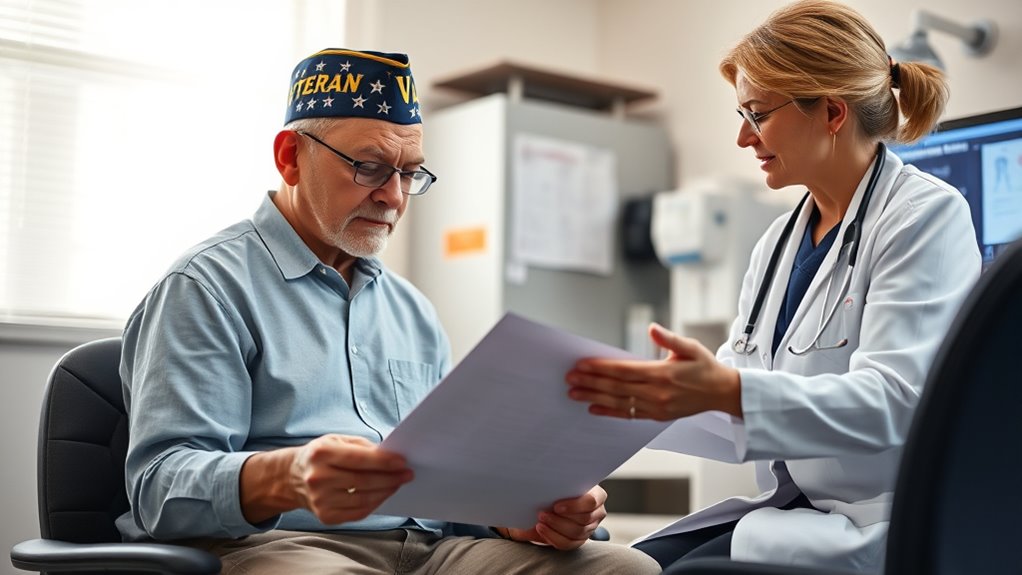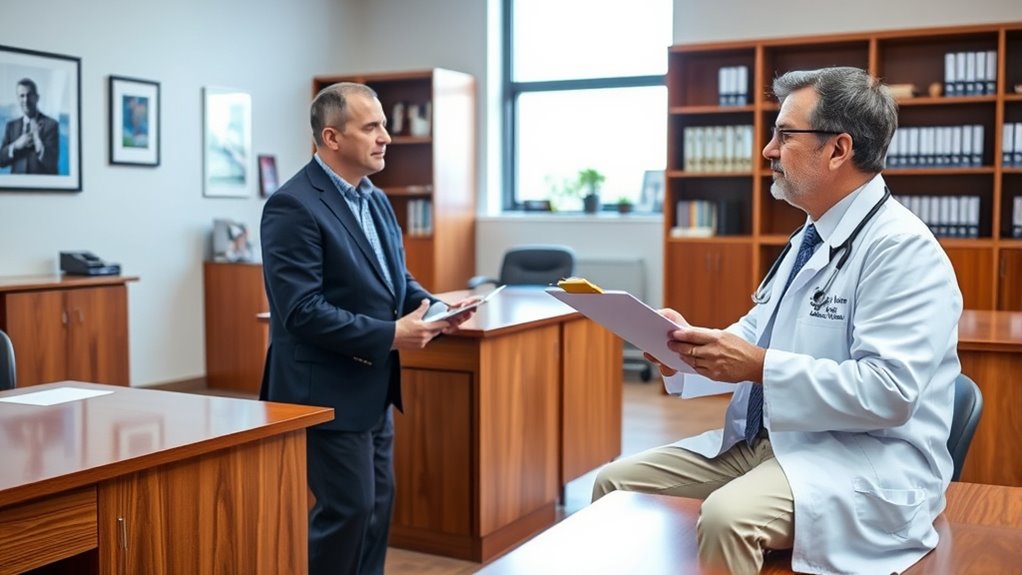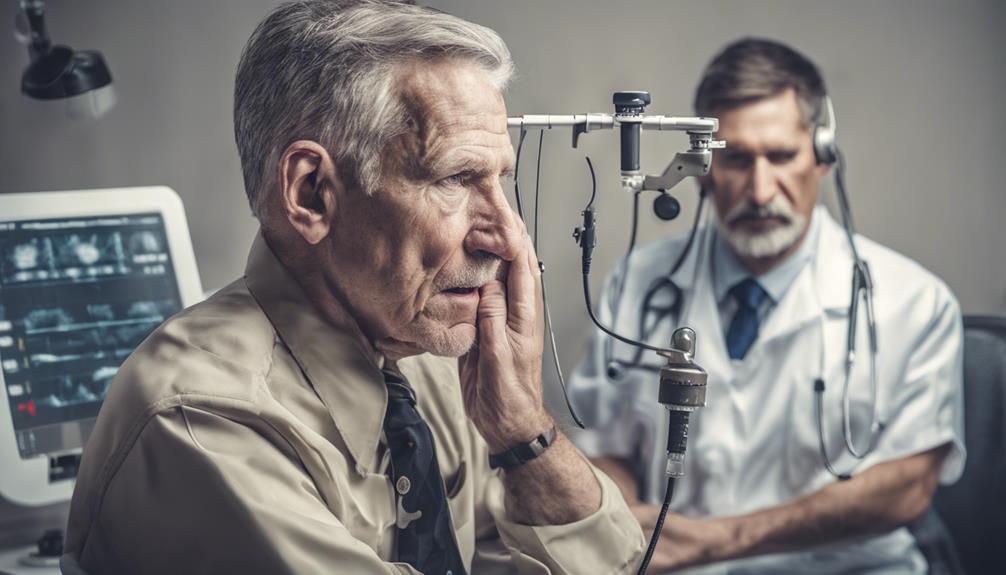To request a second opinion within the VA, start by gathering your medical records through the VA’s Medical Record Access system, either online or in person. Clearly explain your concerns and bring your records to your appointment. You can see a different VA provider or an outside specialist, often with a referral. Coordinate with your VA healthcare team for authorization. If you’re interested in the detailed steps, you’ll find helpful tips to navigate the process effectively.
Key Takeaways
- Review and gather all relevant medical records before scheduling a second opinion.
- Request an appointment with a VA or external specialist, clearly stating your concerns.
- Obtain a referral from your VA primary care provider if consulting outside specialists.
- Bring copies of your medical records to the appointment for review.
- Use VA’s Medical Record Access system to ensure your records are complete and up-to-date.

If you’re seeking a second opinion on your VA health care, understanding the proper steps can guarantee your concerns are addressed efficiently. When it comes to VA disability claims, getting a second opinion can be crucial for ensuring your health and benefits are accurately assessed. The process begins with knowing how to access your medical records, which are essential for any second opinion request. You have the right to review and obtain copies of your medical records, including test results, doctor’s notes, and treatment history. Accessing these records allows you to present a thorough picture of your health status to a different VA provider or external specialist.
To start, you should submit a formal request through the VA’s Medical Record Access system. This can often be done online via the VA’s website or through the VA health portal. If you prefer, you can also do this by visiting your local VA medical facility or mailing a written request. Make sure to be specific about which records you need and provide any necessary identification details to expedite the process. Having detailed, up-to-date medical records helps your new provider understand your condition fully, making their second opinion more accurate and meaningful.
Submit a formal request online, in person, or by mail, specifying your records and providing ID details.
Once you have access to your medical records, you can then seek a second opinion by requesting an appointment with a different VA healthcare provider or an external specialist outside the VA system. If you’re pursuing a second opinion to support a VA disability claim, it’s especially important to ensure the new provider is aware of your current record and treatment history. This can strengthen your case by providing an independent evaluation of your condition, which might influence your VA disability claims decision.
When requesting the second opinion, clearly communicate your concerns and reasons for seeking additional evaluation. Be prepared to discuss your symptoms, treatment history, and the specific questions you want answered. It’s also helpful to bring copies of your medical records to your appointment for review. If your VA provider recommends an outside specialist, you may need to get a referral through your VA primary care doctor, who can assist with authorization and scheduling.
Additionally, understanding the importance of small mistakes in your documentation or communication can help you avoid errors that might delay or affect your second opinion process. Throughout this process, stay organized by keeping copies of all correspondence, records requests, and medical evaluations. Remember, the goal is to ensure your health concerns are thoroughly evaluated, which can impact both your medical treatment and VA disability claims. Taking these steps proactively guarantees you’re making informed decisions and advocating effectively for your health and benefits within the VA system.
Frequently Asked Questions
Can I Request a Second Opinion From a Private Doctor Through the VA?
You can request a second opinion from a private doctor through the VA by arranging a private consultation. To do this, you’ll need to provide your medical records to the VA and get approval for the private consultation. Once approved, you can see a private doctor and share your medical records for the second opinion. This process helps guarantee you get the best care tailored to your needs.
How Long Does It Typically Take to Get a Second Opinion Within the VA?
You might wonder how long it takes to get a second opinion within the VA. Appointment wait times and doctor availability vary, but typically, scheduling can take a few weeks. Factors like location and specialty impact wait times. To speed things up, guarantee your referral is complete and stay in contact with your VA healthcare provider. Patience and proactive communication help you get the timely second opinion you need.
Are There Any Costs Associated With Obtaining a VA Second Opinion?
You might wonder if there are costs when getting a VA second opinion. Generally, veteran benefits cover the costs of additional medical evaluations if your primary VA healthcare provider recommends it. You won’t face out-of-pocket medical costs for these second opinions, guaranteeing you access the care you need without financial stress. Always check with your VA healthcare provider to confirm coverage details and ensure your medical costs are fully covered.
Do I Need My Primary Doctor’S Approval to Seek a Second Opinion?
Think of your healthcare journey as a road trip—you’re the driver, and your destination is the best care. You don’t need your primary doctor’s approval to seek a second opinion within the VA. Just provide your medical records, and VA staff can help arrange it. Your medical records are your map, guiding specialists to give accurate advice without needing permission from your current doctor.
What if I Disagree With the Va’S Second Opinion?
If you disagree with the VA’s second opinion, you can use the dispute resolution process to address your concerns. Start by discussing your disagreement with your healthcare provider or VA representative. If unresolved, you can pursue an appeal through the VA’s formal appeal process. This allows you to present new evidence or medical opinions, ensuring your case is thoroughly reviewed and your concerns are properly considered.
Conclusion
Getting a second opinion within the VA can give you peace of mind and guarantee you’re getting the best care. Did you know that nearly 30% of veterans seek a second opinion at some point? This shows how important it is to advocate for your health. Remember, you’re entitled to explore your options, so don’t hesitate to ask for that second opinion. It could make all the difference in your treatment journey.











